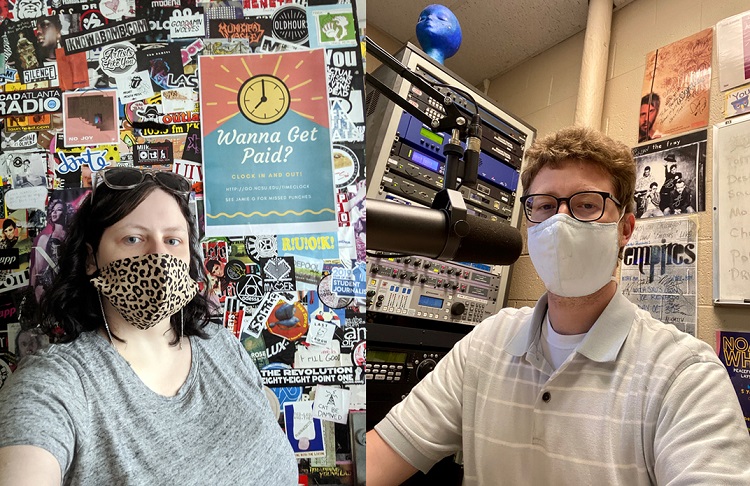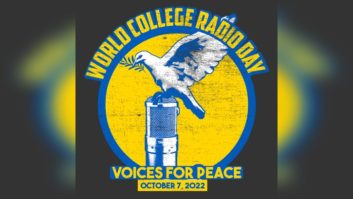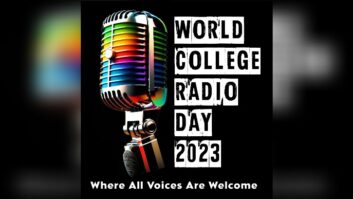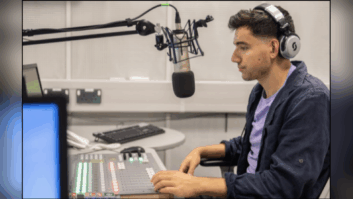
Author Rob Quicke is founder of the College Radio Foundation and College Radio Day, and a professor at William Paterson University, New Jersey.
Across the United States, and indeed the world, college stations have been coming to terms with the start of the new academic year, and how that would impact their operations.
Earlier this year the Federal Communications Commission recognized the challenging operational situations for many college radio stations and made allowances.
Attorney David Oxenford wrote: “The FCC in March allowed noncommercial radio stations licensed to educational institutions to consider periods when schools were closed for in-person instruction as school breaks or ‘recess’ periods when the minimum operating schedule for these stations did not apply.”
For stations that are still online, that guidance still applies, but “If your school has welcomed students back to campus and is operating other student activities, then the question gets murkier.”
Oxenford suggests that in “situations where schools are open or partially open to students, if the station cannot meet the minimum operating requirements … the FCC will likely be willing to grant a station temporary authority to remain silent.”
For many radio stations, studios have been physically off-limits for months, as college administrators shut down facilities awaiting hopeful developments in the fight against the global pandemic. Recently that window has been closing, with many colleges electing to bring back some students to campus in a limited fashion.
Some stations never ceased broadcasting operations but found ingenious technological ways to harness the students’ talents remotely and kept programming going throughout the summer. Now college radio enters a time where great hopes are matched by equally great fears.
“Quarantine Takeover”
A resurgence of the virus is the primary worry for many in college radio.
“Our fear, like everyone else, is that we will have a failure of social distancing and common sense that leads to a second bad wave of illnesses and a return to limited access or closures on campus. We are planning for that unfortunate potential,” said John Devecka, operations manager at WLOY, Loyola University in Maryland, in late summer.
The impact of the pandemic earlier did not affect WLOY’s ability to continue producing radio.
“Over the course of the closed spring semester we were able to send microphones and/or headsets to a number of key regular DJs and staff to make sure that people had the ability to produce a solid show from home,” he said.
Recently, WLOY has gone further. “We started a special series of ‘Quarantine Takeover’ shows based on our normal in-station ‘Studio Seizure’ shows where musicians become the DJs for an hour. The Takeover shows are created by the musicians in their home studios for us and have been rolling in from all over the world,” said Devecka.
Many college radio stations also took similar actions and have been able to continue to produce content remotely.
But the prospect of continuing like this, operating remotely indefinitely, is concerning for many. There are ongoing consequences that being online only or limiting the amount of time spent in the radio station studios will have on the training and experience that the students will now receive.
Lance Liguez is faculty advisor for UTA Radio.com at the University of Texas at Arlington.
“My hope is that students will be able to return for a sustained period of time and receive hands-on training in board operation and on-air performance.” When he spoke, the plan was to come back in late August with social distancing mandates in the studio, cleaning protocols, and disposable mic covers.
He acknowledged that running a board virtually is possible but said expense is an obstacle. “My university, like many others, is in cost-cutting mode. Getting back into the studio means a chance to further hone on-air and production skills for our advanced students, who conduct shows ranging from sports talk to R&B hits,” he says. “Then there’s the students new to broadcasting. We typically have around 40 every fall semester, all of whom need to be physically in front of the board.”
Not being able to have access to real, hands-on experience will affect the students’ development and knowledge, and is a fear shared by many in college radio.
Loss of revenue
It’s not just the loss of valuable hands-on experience that causes concern, but also the loss of underwriting revenue coming into the station.
At WKNC 88.1 FM HD-1/HD-2 at North Carolina State University, there has already been a real economic cost to the pandemic. Jamie Lynn Gilbert, associate director of student media, can measure the impact of COVID-19.
“We get a sizable chunk of revenue from airing Wolfpack women’s basketball and baseball games each year. We lost several thousand dollars when the season was cut short and we won’t see any revenue if the seasons aren’t able to start safely,” she said.
“We also rely on money earned during a two-night benefit concert every February. While we are brainstorming ways to make this happen, I don’t expect to earn $5,000 from ticket sales in just a few months. Some of our major underwriting clients — local music venues — still haven’t reopened, so there is a loss there as well.”
Despite these disruptions, college radio stations are adapting to the precautions needed to continue producing in-person radio during this time, and this is true at WKNC.
“We have mask and cleaning requirements, along with a one-hour break between live DJs,” Gilbert said. “We had 15 DJs come back and added another 20 with the start of the new semester on Aug. 10. That’s less than half what we normally see in a semester, but it’s not surprising.”
Despite these effects, there is hope. Adapting to these challenging circumstances means that there has been a necessary refocusing for some college radio stations, and that’s not necessarily a bad thing.
Hannah Copeland is general manager of 90.5 KCSU at Colorado State University. “My hope is that more virtual school time will reinvigorate an interest in producing work besides radio, because most of the jobs out there are in audio production, writing, journalism, and online content creation,” she said.
“There just are not that many jobs for regular radio DJs unless a student is incredibly gifted and in the top 1% of talent. Plus, many of those radio jobs, especially in commercial, don’t seem to be very stable or full time. So, I’m hoping our podcasts, videos, social media and articles grow.”
Despite the uncertainty over the future impact of the COVID-19 pandemic, college stations were busy this summer formulating plans and ideas of how to operate in a variety of circumstances as the academic year now gets underway.
“Smart young people”
Similarly, college media conferences and events have been affected, with many of them becoming online-only in response to the current circumstances.
College Broadcasters Inc. was planning its National Student Electronic Media Convention to take place in Baltimore in late October, but that will now take place entirely online. In a statement to its members, CBI explained its board “has decided, after extensive research and discussion, that this is best for the safety of CBI members and guests.”
Oct. 2 is College Radio Day, an event that typically sees hundreds of college radio stations participate across the country. Recognizing that it is not business as usual for many college stations, College Radio Day is encouraging participating stations to plan on virtual participation and engagement through social media. As organizations embrace new operating models and ideas, college radio stations are doing the same.
At WLOY, John Devecka says that even though they are not on campus, where there’s a will, there’s a way.
“We are closed for the fall officially now, so our student exec team has been working hard to plan new ways of engagement with our scattered staff, DJs and student body. It’s going to be a challenge, but we’ve got smart young people who will make it work.”
This optimism is echoed by Peter Kreten, director of student media at Saint Xavier University in Chicago and general manager of WXAV 88.3 FM. Kreten finds reasons for optimism in the face of an uncertain future. Because of COVID-19, there has been an acceleration towards embracing technologies and practices that were already underway.
“I see hope. Over the last few years, college radio has begun an evolution. This evolution is seeing students, faculty, and advisors embracing new technologies and practices, while providing students with an educational experience like none other. It is truly an exciting time.”
Despite serious concerns, it’s possible that there might be unexpected benefits to a situation that a few months ago no one could have imagined. Many involved with college radio believe that they are more than capable of rising to the challenge of this moment.
Comment on this or any story. Email [email protected] with “Letter to the Editor” in the subject field.







